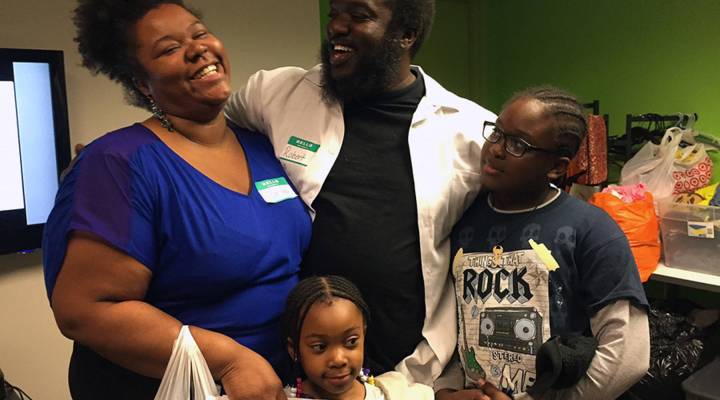
A Baltimore program tries to help unmarried couples with children build more stable relationships
A Baltimore program tries to help unmarried couples with children build more stable relationships

Robert Johnson and Tanisha Asamu sat knee to knee, gazing into each other’s eyes.
“I appreciate your patience, because I know I’m not always the easiest person to deal with,” Johnson said.
“I appreciate how important family is to you, including us, of course,” Asamu said back.
It was not the most romantic setting — a conference room at the Center for Urban Families, a social services organization in Baltimore. The exercise was part of a class designed to help low-income couples raising children build more solid relationships.
Counselor Scott Davis told the group that regular appreciation is one way to fill a partner’s so-called “love bank.”
“Do you know what happens when you have a $100 argument, and there’s $2 worth of love in your partner’s love bank?” he asked them. “You get insufficient funds. That’s when you start yelling and screaming at each other.”
Seven couples, all unmarried, meet here twice a week for eight weeks. The program provides transportation to the center and child care, with a literacy program for the kids. Between sessions on conflict resolution, parenting and budgeting, the couples have dinner. To make it a little more date-nighty, caterers deck out the conference room tables with black table cloths and fresh flowers.
“The food is good,” Johnson said. “The dinner, that’s a big selling point.”
Johnson and Asamu have been together about five months. She’s a school secretary. He drives a taxi.
“That’s actually how I met her,” Johnson said. “I used to transport the kids back and forth to her school, and I used to see her every day. She’s like the prettiest girl in the school.”
They each have a child from a previous relationship and hope to get married, but Asamu said they have a few things to work on.
“I really want to learn to be more financially responsible,” she said. “We want to get a house, things like that. How to work together to make it happen.”
If they do tie the knot, Johnson and Asamu would be in the minority. Marriage rates have been falling in this country since the late 1960s. But not evenly. Today, just 39 percent of working-class Americans are married, and only 26 percent of adults considered poor, according to a paper by researchers Brad Wilcox and Wendy Wang published this fall. That’s compared to 56 percent of middle- and upper-class adults.
“This marriage divide in America leaves many working-class and poor kids doubly disadvantaged,” said Wilcox, with the Institute for Family Studies.
Those children, Wilcox said, not only grow up with less income, “they also have access to less of their second parent’s time and attention — usually their father’s time and attention.”
There are lots of reasons for the divide. Changes in the economy have made it harder for men without college degrees to achieve financial stability. Some say programs like Medicaid and food stamps can discourage lower-income couples from marrying to avoid losing benefits.
But while it’s tempting to see marriage as a cure for poverty, said Kristi Williams, a sociology professor at the Ohio State University, “it’s really that poverty and the circumstances in which the poor live in the U.S. are actually themselves huge barriers to entering and sustaining the kind of marriages that are healthy environments for children.”
Government efforts to promote marriage, like the Healthy Marriage Initiative funded through welfare dollars, have done little to improve children’s economic well-being, Williams said.
“The last time I looked, about $1 billion had been spent on these programs throughout the U.S., and that’s $1 billion that are not being used to improve the economic circumstances more directly for families and children,” she said.
Baltimore’s Center for Urban Families has received some of that funding and will soon get its own evaluation. Founder Joseph Jones sees healthy relationships — and not necessarily marriage — as part of the solution. The center also follows up with couples after they graduate and offers services such as job training and a responsible fatherhood program.
The way Jones sees it, if a couple already has children, “what can we do to help strengthen their relationship to ensure that the child or children have uninterrupted access to both parents over time?”
So far about 130 couples have graduated from the relationship program. A handful have married. Robert Johnson and Tanisha Asamu hope they might be next.
“We’re aiming for next year, and we’re going to try to get this program to pay for it,” Johnson said, laughing. “They don’t know it yet.”
| Why do welfare funds go to marriage counseling? |
| Marriage and the class divide |
| How education changed because of welfare reform |
There’s a lot happening in the world. Through it all, Marketplace is here for you.
You rely on Marketplace to break down the world’s events and tell you how it affects you in a fact-based, approachable way. We rely on your financial support to keep making that possible.
Your donation today powers the independent journalism that you rely on. For just $5/month, you can help sustain Marketplace so we can keep reporting on the things that matter to you.


















